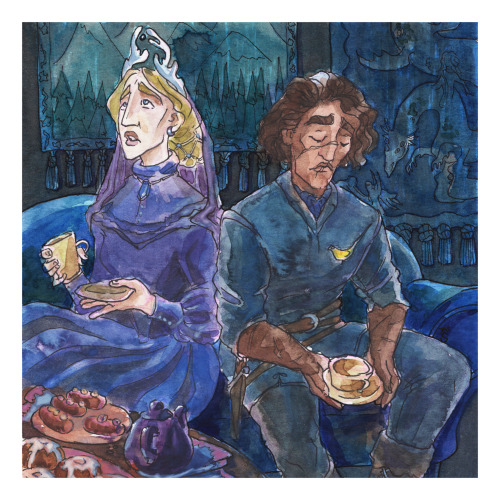Read the previous entry in the series here.
Read the next entry in the series here.
The next chapter, “Shared Sorrows,” begins with verses from Starling Birdsong before turning to Fitz waking where he had dozed off while awaiting Dutiful. The Prince has not attended his scheduled meeting, occasioning rueful disappointment from Fitz. He leaves a message for the wayward royal and returns to Chade’s hidden rooms, where he is again confronted by the power of Thick’s Skill. He steels himself against it and, when Chade addresses him as though he were a young child, intercedes, noting Thick’s different intellect and Dutiful’s neglect.

Katrin Sapranova’s Mourning Nighteyes, used for commentary.
Chade swiftly conducts Fitz to a meeting with Kettricken, who mourns for the lost Nighteyes. Her mourning triggers Fitz’s, and the two weep together for a time. Kettricken then brings up the topic of Dutiful’s Wit, noting its source in her, and she speaks with Fitz regarding his comfort and care. She also repeats something of Shrewd’s old gesture to Fitz, and Fitz asks her about Rosemary. She notes the disposition of her former adversary, as well as others, and Fitz begrudgingly accepts the reasoning involved.
Their talk turns to the Piebald threat, both as it directs itself toward Fitz in particular and as it menaces the Six Duchies more generally. And it takes in some of the Outislanders’ concerns, as well, before Fitz excuses himself with Kettricken’s welcome wishes for healing.
The return to Thick in the present chapter would seem to be a motion towards consideration of neurodivergence and disability. As is the case with many things, my scholarship and background is deficient in terms of treating those concerns, although I’d imagine that such scholars as Kisha Tracy would have more to say about it. (At least I can point to other scholars this time!) From the vantage of re-reading, I can say that it’ll be something of a theme, moving forward; Hobb gets into many kinds of difference in her novels, treating them openly (if perhaps not always ideally) in a way that too many other authors elide, especially in fantasy fiction. (Problems with similar concerns have been noted.) I’m glad to (again) see it happen with Thick; at least the conversation is happening.
The present chapter also reinforces something I’ve noted as being an issue throughout the Six Duchies novels. Throughout, there is a clear message that upright conduct is, ultimately, untenable on its own; the exalted courtly structures so frequently depicted in fantasy literatures and held up as aspirational examples flatly cannot exist on their own. No, they consume and cast out, making use of “necessary evils” such as Fitz is trained to be and setting them aside–and if it is the case that Fitz accepts effective exile, it is also the case that he has little choice in the matter. And that says something worth attention.
[…] Read the previous entry in the series here.Read the next entry in the series here. […]
LikeLike
[…] the previous entry in the series here.Read the next entry in the series […]
LikeLike
[…] those tasks involve making a clandestine report to Chade. Along the way, he manages to confirm his suspicion that Rosemary is Chade’s present apprentice, as she seems to have suffered similar injuries to Chade’s own. Soon after, Badgerlock […]
LikeLike
[…] are some evocative parallels. Web’s status is one, while Kettricken’s Wittedness (noted here and elsewhere) is another; there are clearly Old Blood in the Mountain Kingdom, among others. […]
LikeLike